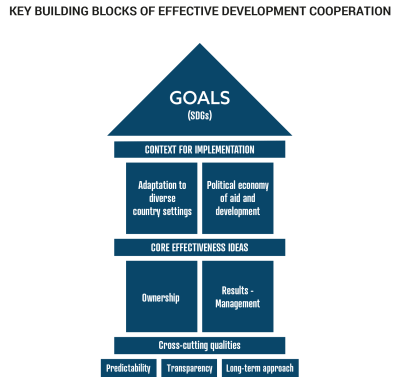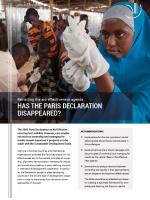Has the Paris Declaration Disappeared?
■ Explanations for the lost momentum on aid effectiveness should have a central place in future dialogue.
■ Development partners should reengage with the principles of ownership and managing for results as the central ideas in the effectiveness agenda.
■ Donors should analyse tensions between ownership and results in their approaches to ensure longterm development effectiveness.
• The SDGs should be emphasized as a basis for creating a legitimate framework for ownership and directing the focus on results.
Well over a hundred countries and international organizations endorsed the Paris Declaration on Aid Effectiveness and its five central principles of ownership, alignment, harmonization, managing for results, and mutual accountability. It was a defining moment in international development cooperation. In particular, the Declaration sought to place developing countries in the ‘driver’s seat’ of development cooperation in order to move away from the donor-driven approaches of the past.
Although the Paris Declaration enjoyed political support up to the High-Level Meetings in Accra in 2008 and in Busan in 2011, its role in framing donor action has declined. A review of the current development strategies of ten donor countries (Belgium, Canada, Denmark, the EU, France, Germany, Netherlands, Norway, Sweden and the United Kingdom) reveals that effectiveness principles are scarcely mentioned, though some donors, such as the EU and Sweden, still emphasize core elements of the agenda. Many donors engage selectively with the prescriptions of the Paris Declaration. For example, the Declaration’s focus on managing for results has evolved, increasingly reflecting donor concerns over accountability, rather than strengthening country-based reporting frameworks as originally intended.
The Global Partnership for Effective Development Cooperation (GPEDC) currently provides a platform for continuing international dialogue on effectiveness issues, but it has struggled to define its niche and maintain the engagement of core stakeholders. Reinvigorating the effectiveness debate goes hand in hand with ensuring that the GPEDC’s work is relevant for development cooperation providers and partners alike.
Early experience with implementation
The Paris Declaration summarized core lessons from decades of development cooperation. It indicated that, for aid to be more effective, priorities should respond to locally determined needs, the multitude of actors involved needed to work better together, and the effects of interventions should be better documented and analysed. These ideas were translated into twelve indicators of progress, including actions like formulating national development strategies and making increasing use of country systems for implementation. Although the indicators suggested that promoting more effective aid results from technical adjustments, progress on the agenda depended on political shifts.
Monitoring reports quickly documented the fact that implementation of the principles did not live up to expectations. Six out of twelve targets had already come off track by 2008, with the use of country systems presenting a particular challenge.
An evaluation in 2011 concluded that, of the five central principles, the most progress was registered with ownership, whereas progress with alignment and harmonization had been uneven, and managing for results and mutual accountability had shown little progress. While governments supported the aid effectiveness agenda in international meetings, neither donors nor partner-countries seemed very much inclined to make the necessary political adjustments.
Significant challenges
To ensure that core insights from the Paris agenda persist in the context of the implementation of Agenda 2030, it is important to learn from the challenges that contributed to the decline in the attention being paid to the principles.
If Agenda 2030 is taken seriously, the ideas underlying the aid effectiveness agenda may experience a revival
First, the agenda was conceived with a particular picture of donor and partner countries in mind. It was based on an assumption that both groups were more homogeneous than they were either then or now. Thus, donor countries were all expected to be concerned about aid effectiveness and development results, but in reality they differed substantially with respect to organization, experience and central interests. Among partner countries the differences were just as significant, and institutional constraints hindered many fragile societies from seizing the envisaged ownership. The diverse starting points and profiles of donors and partners indicate that progress in implementing effectiveness principles can follow different pathways.
Second, the five principles are not as compatible as they first appeared. For example, strengthening ownership, management for results and the harmonization of donor practices are not always mutually supportive prescriptions. Strengthening ownership may require long-term capacity development, which produces few results in the short run. An explicit focus on managing for results can easily divert attention from the coordination and harmonization of donors, which is typically a cumbersome, resource-demanding affair. Harmonized, well-coordinated donors may acquire the leverage to push political agendas, thereby undermining ownership.
The uneasy relationship between the principles creates trade-offs and room for diverse interpretations of the focus of the effectiveness agenda. At the same time, the potential trade-offs indicate that progress in implementing effectiveness principles should be based on assessments of individual indicators, as well as on the analysis of how the different dimensions of effectiveness interact in given settings.
Third, some modalities, notably general and sector budget support, were identified as superior to others in advancing effectiveness. However, they faced their own challenges related to donor coordination and government ownership of development cooperation. Whenever donor agencies struggled to have confidence in partner government policies and practices, these modalities appeared less optimal. A lesson for current practice is that a fixation on specific modalities as more effective than others can overlook common challenges across approaches. Project aid or pooled approaches can display varied strengths depending on the task at hand, and their use can reflect the need to find a specific balance between effectiveness considerations in a given context.
Perspectives for the Future
These obstacles suggest that the reduced visibility of the Paris agenda reflects the complexity of the relationships involved in development cooperation. However, core insights from the experience underlying the aid effectiveness agenda, namely that partner ownership is the key to sustainable results and that managing for results is necessary to promote accountability and learning, have not lost their relevance.
International development cooperation encompasses a broad variety of approaches that reflect the diversity of actors, interests and implementation contexts involved. Currently, some donors are increasingly turning to multilateral assistance, partly due to administrative cuts. Some donors focus on results related to their own specific objectives in order to be able to document their achievements and respond to domestic political pressure. Others are increasingly preoccupied with commercial and other interests that are not directly related to long-term development objectives. In this fragmented setting, there are different ways of balancing core goals and interests.

However, the fact that development cooperation takes place within the framework of Agenda 2030 and the Sustainable Development Goals (SDGs) helps focus development cooperation, as well as increasing the prospect that donor and partner governments can agree on development priorities, thereby strengthening ownership. It also strengthens the focus on results, as the regular monitoring of the SDGs reveals shortcomings and progress. Importantly, the holistic perspective put forward by Agenda 2030 calls for an understanding of development cooperation as a multi-dimensional tool. This in its turn requires reflecting on how different strands of engagement and varied actors work together, adding a reason to rediscover the collective orientation of the effectiveness agenda.
If Agenda 2030 is taken seriously, the ideas underlying the aid effectiveness agenda may experience a revival, given the thoroughly documented insight that partner ownership in development cooperation is a prerequisite for producing long-term outcomes in sustainable development.
This DIIS Policy Brief has received financial support from the Ministry of Foreign Affairs of Denmark. It reflects the views of the authors alone.
DIIS Experts


